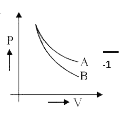The enthalpy of a system increases by 50 kJ when its internal energy is increased by 113 kJ. What is the pressure in kNm−2 of the system if the volume of gas is reduced by 103m3 at constant pressure?
The correct Answer is:6.3
To find the pressure of the system, we can use the relationship between enthalpy (ΔH), internal energy (ΔU), and the change in volume (ΔV) at constant pressure. The formula we will use is:
ΔH=ΔU+PΔV
1. Identify the given values:
- ΔH = 50 kJ
- ΔU = 113 kJ
- ΔV = -1000 m³ (since the volume is reduced)
2. Rearrange the enthalpy equation to solve for pressure (P):
P=ΔH−ΔUΔV
3. Substitute the known values into the equation:
P=50 kJ−113 kJ−1000 m3
4. Calculate the numerator:
50 kJ−113 kJ=−63 kJ
5. Substitute this result back into the equation for pressure:
P=−63 kJ−1000 m3
6. Convert kJ to kN·m (since 1 kJ = 1 kN·m):
P=63 kN⋅m1000 m3
7. Perform the division:
P=0.063 kN/m2
8. Convert to kN/m²:
P=63 kN/m2
Final Answer:
The pressure of the system is 63 kN/m².
- ΔH = 50 kJ
- ΔU = 113 kJ
- ΔV = -1000 m³ (since the volume is reduced)
P=ΔH−ΔUΔV
P=50 kJ−113 kJ−1000 m3
50 kJ−113 kJ=−63 kJ
P=−63 kJ−1000 m3
P=63 kN⋅m1000 m3
P=0.063 kN/m2
P=63 kN/m2
The pressure of the system is 63 kN/m².
Topper's Solved these Questions
- THERMODYNAMICSBOOK - VMC MODULES ENGLISHCHAPTER - THERMODYNAMICSEXERCISE - JEE (MAIN ARCHIVE)
32 Videos
- THERMODYNAMICSBOOK - VMC MODULES ENGLISHCHAPTER - THERMODYNAMICSEXERCISE - JEE ADVANCED (ARCHIVE)
44 Videos
- THERMODYNAMICSBOOK - VMC MODULES ENGLISHCHAPTER - THERMODYNAMICSEXERCISE - LEVEL-2
50 Videos
- THERMOCHEMISTRYBOOK - VMC MODULES ENGLISHCHAPTER - THERMOCHEMISTRYEXERCISE - JEE ADVANCED (ARCHIVE)
31 Videos
- THERMODYNAMICS & THERMOCHEMISTRYBOOK - VMC MODULES ENGLISHCHAPTER - THERMODYNAMICS & THERMOCHEMISTRYEXERCISE - Impeccable
48 Videos
Similar Questions
Knowledge Check
A system absorbs 50 kJ heat and does 20 kJ of work. What is the net change in the internal energy of the system ?
AIncrease by 30 kJBDecrease by 30 kJCIncrease by 70 kJDDecrease by 70 kJWhat will be the change in internal energy when 12 kJ of work is done on the system and 2 kJ of heat is given by the system?
A+10kJB−10kJC+5kJD−5kJ
The work done by a system is 8 Joule, when 40 joule heat is supplied to it .What is the increase in internal energy of the system?
View SolutionBy what percentage should the pressure of a given mass of a gas be increased so as to decrease its volume by 10% at a constant temperature?
View Solution143 calories of heat energy are supplied to a gas . Its internal energy rises by 500 joules . If the pressure remains constant and is equal to 105Nm−2 , the change in the volume of the gas is
View SolutionWhat is the change in internal energy if 10 J of heat is given to system at constant pressure and 20 J of work is done by the system?
View SolutionAn ideal gas is compressed at constant pressure of 105Pa until its volume is halved. If the initial volume of the gas as 3.0×10−2m3, find the work done on the gas?
View SolutionWhen volume of system is increased two times and temperature is decreased half of its initial temperature, then pressure becomes ………….
View Solution

